Q&A with Camille Morgan, MD/PhD student in Epidemiology
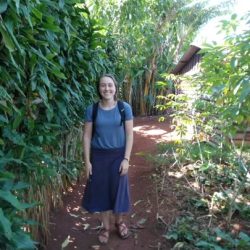
Camille Morgan
What was your background prior to coming to Gillings?
My current work as a doctoral student at Gillings is actually my second time here. I did my undergraduate degree in biostatistics several years ago, and then worked at the National Cancer Institute’s Center for Global Health (NCI-CGH) and the Johns Hopkins Bloomberg School of Public Health. When I finished the BSPH in biostatistics, I knew I wanted to expand on this quantitative foundation through graduate work, but I wanted work experience to explore and confirm the research skillset and subject area that I wanted out of graduate school. These experiences at NCI-CGH and Hopkins were incredibly informative toward my long-term goals. I found my interest in becoming a physician-epidemiologist in infectious diseases, and I also had the chance to think about research from the funder’s perspective, not just the academic’s. How do funders write grant opportunities to develop and attract the right scientific questions by the people with the right skillsets to answer them, such that we can implement policy and programs the result in improved health outcomes? There are many interesting questions out there, but not all will translate to improving health, and I think about this framework as I develop my own research questions.
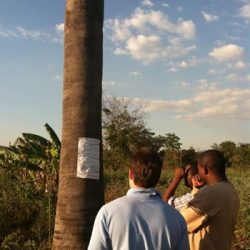
Survey team in Malawi reviews a community’s rules for use and management of the shared water pump, summer 2013
Will you tell us more about your work with the UNC Water Institute?
The opportunity to conduct undergraduate research with the Water Institute was a pivotal transition that led me to pursuing a PhD in epidemiology. I first discovered my interest in a research career through an undergraduate field geology course my first year in college (thank you Allen Glazner and Drew Coleman and the rest of GEOG 72H!). I loved working on a team collecting data in the field, learning from mentors, and writing up and presenting the results. I gravitated toward an interest in working on human health and found an opportunity to assist with a water and sanitation evaluation through the Water Institute. It was challenging and I don’t think I was very good initially. I then had an opportunity to help conduct interviews in rural Malawi to understand the use and distribution of P&G’s water packet purifier PUR. I loved meeting and interacting with people, learning a new language, and understanding different perspectives, all while conducting scientific research. I really began to see myself doing this as a career.
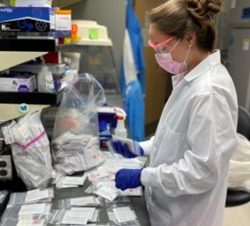
Camille Morgan processing samples in the Infectious Disease Epidemiology and Ecology Lab, September 2021
I returned from Malawi just as World Vision International decided to fund the UNC Water Institute to conduct a baseline evaluation of their water, sanitation, and hygiene programs. I got to work with Dr. Georgia Kayser to develop the surveys, analyze the data, and write up program recommendations from the findings. I focused on estimating access to water, sanitation, and hygiene in schools, in which we found fairly poor access to hygiene services like soap or menstrual hygiene management, and now there is more emphasis on these aspects.
I regularly reflect on what I learned through conducting research as an undergraduate, and appreciate the opportunities I had through the Water Institute.
Can you tell us about your MD/PhD program?
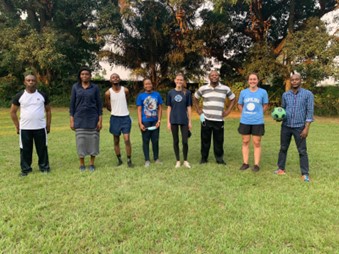
Soccer in Kinshasa, with colleagues in DRC, summer 2021 (Camille Morgan second from right)
We have an incredible MD/PhD program here at UNC. We have students with research and PhD interests not only across departments, but also very interdisciplinary within departments. Through seminars, case conferences, teams, and an annual retreat, we get to interact with students across the program regularly, which creates a strong cohesion within the program. I’ve completed two years of medical school, and will finish the final two years after finishing my PhD. With other MD/PhD students, I’ve been able to attend the National Conference for Physician-Scholars in the Social Sciences and Humanities, manage a monthly endocrinology clinic at the Open Door Clinic in Alamance County, conduct research in the DRC, and play many sports, including soccer and spikeball.
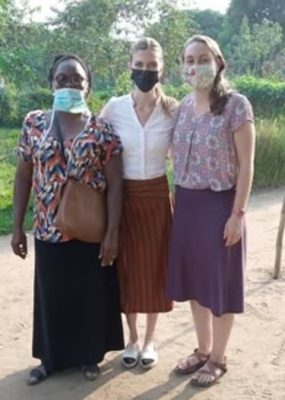
Visit to Maluku health facility with fellow Gillings doctoral candidate, Alix Boisson, Kinshasa, summer 2021 (Camille Morgan on far right)
Will you tell us about your research in the DRC?
I have the opportunity to work with incredible researchers and mentors both here at UNC and in Kinshasa. Although our group (the Infectious Disease Epidemiology and Ecology lab, “IDEEL”) has focused on malaria, I primarily work on the collaborations focused on hepatitis B. With my mentors at UNC, Drs. Jonathan Parr and Peyton Thompson, we are conducting an ongoing study to understand hepatitis B transmission within households, to evaluate potential routes of horizontal transmission that would have implications for prevention measures. We recently published a study evaluating the feasibility of implementing WHO prevention of mother-to-child transmission guidelines in Kinshasa. While the HIV care infrastructure is strong, hepatitis B prevalence is higher than HIV prevalence but many hepatitis B prevention measures—including antenatal screening, birth dose vaccination, and prophylaxis around delivery—are not done routinely. There is a lot of potential to leverage the infrastructure and resources that exist for HIV for hepatitis B, which is especially impactful in a setting with moderate hepatitis B prevalence and relatively low HIV prevalence. I work with another Gillings doctoral candidate, Alix Boisson in Health Policy and Management, who is focusing her dissertation on developing an implementation strategy for hepatitis B birth dose vaccination, which has a lot of buy-in from our collaborators in DRC.
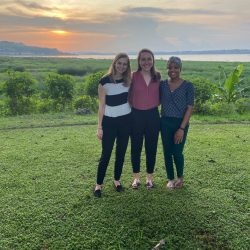
View of the Congo River with fellow Gillings doctoral students, Rachel Sendor (left) and Ruthly François (right). Kinshasa, March 2022 (Camille Morgan in middle)
What does “global health” mean to you?
“Global health” to me means a robust, truly bilateral engagement with partners in a setting different from one’s own. I view working in “global health” not as me traveling to another context, but as a career that includes creating opportunities for students and researchers from outside the US to come train here in the US, just as much as I may be traveling or working in a setting different from my primary institution. It means building scientific capacity in terms of resources and a workforce. I think we are all more creative, more empathetic, more motivated when we are exposed to different places and perspectives, so I believe the antidote to historical (and current) injustices is not receding into our corners, but creating a two-way street of opportunity. I have really appreciated the diversity of perspectives in Gillings, and in the research group I work with (IDEEL), as we have short- and long-term scholars from a range of backgrounds all over the U.S. and world.
What drew you to the Gillings School of Global Public Health?
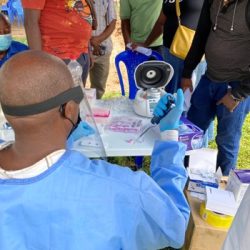
Testing mobile lab protocols, Kinshasa, March 2022
As someone who values the growth that comes from adapting to new places and perspectives, I didn’t expect to return to Gillings for my graduate work, despite a great experience in biostatistics and with the Water Institute. But working elsewhere and building a network with people who have trained all over the world helped me see that UNC is a special place for high quality work and a strong sense of collaboration. Then a previous mentor emphasized how few places offer the molecular and spatial epidemiology expertise I hoped to develop through graduate training. So these factors, plus the strong support by Gillings for students to spend time at collaborating sites, were enough to bring me back!
What is your dream job?
While working in academia is an ideal place for being a clinician, researcher, educator, and international collaborator, I most aspire to build a career working on pressing and interesting clinical and scientific questions with mentors, colleagues, and friends who want to make the world a better place for everyone.
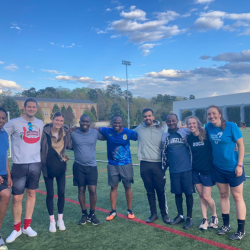
Soccer with friends from Gillings and IDEEL, spring 2022 (Camille Morgan on far right)
What’s your favorite quality in a friend?
I’ve been thinking about this recently as many friends have been at transition points and the pandemic has helped me not take friendship for granted. A particular quality of friends that I’ve reflected on lately is the ability to bring out something better in those around them—whether it’s more kindness or more generosity of spirit, or a higher level of work ethic or encouragement for maximizing others’ potential.
